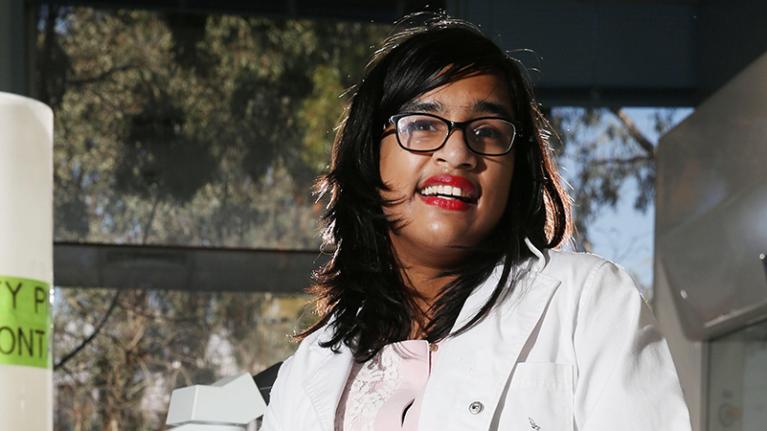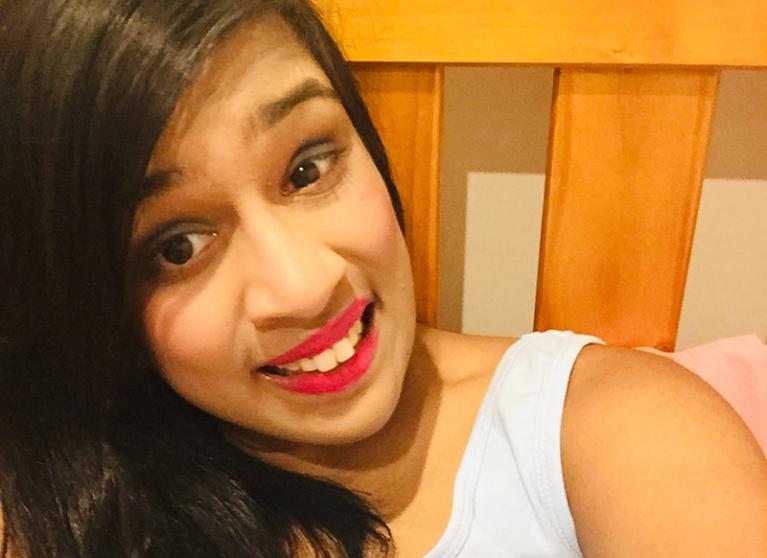An interview with STEM changemaker, Jerusha Mather
Jerusha Mather, a Victoria University PhD candidate in biomedical science, has been selected for the 2020 L’Oréal-UNESCO for Women in Science (FWIS) Mentoring Program, which matches PhD candidates with FWIS Fellows who are leaders in their fields.
Jerusha will be mentored by Dr Valerie Sung, a paediatrician at the Royal Children’s Hospital and Director of the Caring for Hearing Impaired Children clinic.
The pair share a passion for medicine and research. Jerusha, who earlier this year joined the Australian Academy of Science’s group of twelve STEM Women Changemakers, has ambitions to become a medical doctor. She lives with cerebral palsy and is a leading advocate for reforms to improve access to medical education for people with disability.
Jerusha recently secured a career development grant by the Cerebral Palsy Alliance, which was invested in enhancing VU’s neural imaging system (fNIRS) and will support future clinical trials.
She also volunteers at Northern Health and during the COVID-19 crisis, has been writing letters of comfort to the elderly and led a campaign to help others do the same.

Q&A with Jerusha
We caught up with Jerusha to congratulate her and see how she is adapting to the challenges created by the COVID-19 pandemic – professionally and personally.
Congratulations on being selected for the Mentoring Program. When does it start and what do you hope to gain from it?
Thank you. We will meet and do workshops online at the start of June, and I will have the opportunity to learn from my mentor, Dr Valerie Sung. I think that she will be a perfect mentor for me; our interests align.
I have been encouraged to reflect on my life and think about the skills I want to develop. I am still thinking about it, but I know I want to improve on my time-management skills.
How has the COVID-19 pandemic affected your research?
The pandemic has unfortunately affected a lot of research labs globally, and right now it is challenging for PhD students. Many second-year PhD students had to stop their research in the middle of clinical trials; it is a big pause for everyone.
I have had my candidature approved, but my clinical trial hasn’t started yet. Because of the pandemic, instead of doing a clinical trial, I am now doing a systematic review. The clinical trial was going to be a 12-week strength training program in adults with spastic hemiplegic cerebral palsy. We were going to look at the effect of transcranial direct current stimulation before exercise: measuring cortical excitability in the primary motor cortex and its effect on muscle recruitment and strength.
People are finding different ways to manage research online. For this clinical trial, my supervisors are very focused on measuring this in person because the measurements are very technical, and it would be difficult to know whether the participant had completed the activities and measurements as prescribed.
Instead, we will now do a systematic review which will involve critically analysing all of the literature on a topic and extrapolating data from the existing literature. I am working with my supervisors, Associate Professor Jacqueline Williams, Dr Alessandra Ferri, and Associate Professor Wei Peng Teo to confirm what my topic will be.
I am currently looking at the literature on the pathophysiology of spastic hemiplegic cerebral palsy, seeing what in the brain is affected and where it is affected.
How are you adapting personally to these new circumstances?
I am currently working at home. It can get a bit lonely. I try to keep myself going by reading, listening to music, chatting to my friends, talking to my mum and dad. It is very nice to have family near you at this time. You need it.
I mainly keep in touch with my supervisors via email and Zoom. In these uncertain times, we all have to take it day by day. We have to try to enjoy the moment for what it is. Hold on to faith and hope, spread the love, and make good choices. Now more than ever is the time!
In a professional sense, have you been inspired by any responses during the COVID-19 pandemic?
I deeply admire Jacinta Arden's leadership. Her empathetic and compassionate response immensely benefited her country. I think empathy, compassion, and love in solidarity with other nations, is required to create effective and sustainable solutions now and for the future.
Unfortunately, we are not seeing a lot of this in our world today and it is deeply saddening. We can only create global change through love. Not through hate. I believe holding onto peace is very important. That's my political and personal philosophy.
Strategic and creative thinking is essential too. Considering the different dimensions of health, employment, economic wellbeing, and other world issues. And, thinking about how we can solve the issues at hand. The most important priority is to save lives. However, if we can think outside the box, I believe we can save both lives and the economy.
What have you learnt during this time that will guide you in the future?
I think our planet is dramatically changing through this pandemic. Through this crisis, I have noticed the very fragility of planet earth. The way we do research is changing. The way we do business. The way we run hospitals, churches; the way we connect with others. Thankfully, technology has paved the way for us to embrace this change in a positive way. Innovations, new ideas, and policies that we never even imagined are happening now. There are exciting developments.
I hope the Australian community in the same spirit of Mother Teresa and all the other historical social justice leaders, can help heal this hurting world and make it a better place. Bring some joy. Bring some laughter and cheer into the lives that need it. I hope we can altruistically serve our communities and nations.
